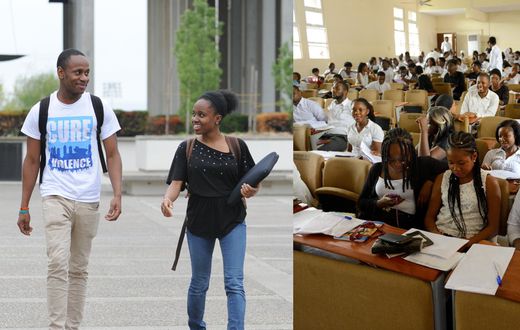In a development that marks a turning point for higher education access in Nigeria, the Nigerian Education Loan Fund (NELFUND) has announced that over one million Nigerians have submitted applications for its student‐loan scheme. According to NELFUND, a total of 1,004,276 students applied as of 2 November 2025, following the launch of the initiative on 24 May 2024.
Of that number, 624,535 students across 239 institutions have been awarded loans so far. The aggregate disbursement from NELFUND now stands at about ₦116.45 billion, split into roughly ₦64.30 billion for tuition/institutional fees and ₦51.15 billion for upkeep/allowances.
For many across Nigeria—students, parents and educational institutions alike—this is more than a statistic: it signals a real shift in government‐backed education financing, offering fresh hope in an era of rising costs and constrained family budgets.

Table of Contents
What This Means for Students and the Sector
Speaking on behalf of the fund, NELFUND’s Managing Director, Akintunde Sawyerr, described crossing the one‐million‐application mark as “a defining moment in Nigeria’s journey toward equitable education financing.” He added:
“Crossing the one‐million mark represents more than data; it represents renewed hope for a generation of Nigerians determined to rise above financial barriers to education.”
From the vantage point of students I have spoken with, the scheme is already reshaping their educational trajectory. One recent graduate told me how she was about to drop out of a polytechnic programme due to inability to pay fees, until she discovered the NELFUND portal and submitted an application. That’s the sort of individual story behind the headline figure.
For the education sector, this milestone underscores that policy intentions are turning into action. By enabling access to funds, NELFUND is helping reduce the financial barrier which has long prevented many young Nigerians from pursuing tertiary education. The disbursement of over ₦116 billion confirms that the initiative is not just about promises—it is delivering resources at scale.
Nevertheless, challenges remain. Managing verification, ensuring proper utilisation of funds, and scaling the operations across a country of Nigeria’s size and diversity are formidable tasks. NELFUND itself has acknowledged the need for continuous process improvement in transparency, efficiency, and access for all qualified Nigerians regardless of background or location.

Tying the Milestone to Broader Policy and Social Context
The achievement of NELFUND comes amid the broader framework of the federal government’s education agenda, particularly the Bola Ahmed Tinubu-led Renewed Hope Agenda, which sets human capital development and inclusive growth among its top priorities. According to NELFUND, the successful application rate reflects the impact of this vision.
In Nigeria’s context, tertiary education has often been a privilege reserved for those whose families can afford the fees and associated costs—even as tuition keeps rising and job market pressures intensify. That barrier has an outsized effect on students from lower-income homes, remote regions, or historically marginalised communities. The ramp-up of NELFUND’s scheme signals a deliberate policy curve inward toward fairness and access.
But access is only one piece of the puzzle. Once a student secures funding, there is still the question of how effectively the education system delivers value: quality of teaching, relevance of programmes to job markets, retention rates, dropping out, and graduate employment outcomes. In that sense, the numbers from NELFUND are a promising indicator—but not the whole story.
From a personal perspective, I recall mentoring a young student in Abuja in 2023 who had to switch to part-time evening classes because she couldn’t raise funds for her morning tuition. Hearing from NELFUND that so many students are now reaching for education without the immediate burden of fees gives me hope—not just for her cohort, but for the next generation across Nigeria.

Next Steps for NELFUND and Stakeholders
As the milestone of one million applications is celebrated, attention now turns to the next critical phase. For NELFUND, the roadmap ahead includes several key priorities:
- Streamlining the application and verification process: With over one million applications, operational efficiency becomes critical. NELFUND has already emphasised a commitment to “continuous process improvement” to ensure transparency and efficiency in disbursement.
- Monitoring impact and outcomes: It’s not enough to hand out loans; tracking how students finish their programmes, graduate and succeed in employment will prove the system’s value.
- Expanding reach to underserved regions and institutions: With 239 institutions already included, there remains potential for outreach to more polytechnics, colleges of education, and remote campuses.
- Ensuring accountability and financial sustainability: Managing borrowing, good use of funds, avoiding waste or fraud—all matter in maintaining trust in the scheme.
- Engaging with students to raise awareness: Many potential applicants may still be unaware of NELFUND’s scheme or unsure of how to navigate it.
For students and families, the key message is: if you qualify, applying to NELFUND may help unlock your tertiary‐education journey. Institutional administrators also have a role—by helping with verification, assisting students, and ensuring compliance with fund guidelines.
In conversations I’ve had with student leaders, one recurrent theme is the need for clarity about repayment terms, support after graduation, and transparency around how funds are allocated (tuition vs upkeep). NELFUND’s public statement emphasises a non-discriminatory approach—covering Christians, Muslims, and others across ethnic lines—as a unifying framework.
Ultimately, reaching one million applications is only the beginning. The aim now is to translate this interest into graduation success, job readiness, and a stronger pipeline of human capital for Nigeria’s future.
Conclusion
The landmark number—over one million applications to the NELFUND student-loan scheme—speaks volumes about youth ambition, policy direction and the potential for change in Nigerian tertiary education financing. While the foundation has been laid, the real test lies ahead: ensuring that the funds translate into degrees earned, jobs secured and lives transformed. With that in mind, NELFUND’s journey is one to watch closely—because the ripple effect could extend well beyond individual students, influencing Nigeria’s human-capital trajectory for years to come.
Join Our Social Media Channels:
WhatsApp: NaijaEyes
Facebook: NaijaEyes
Twitter: NaijaEyes
Instagram: NaijaEyes
TikTok: NaijaEyes
READ THE LATEST EDUCATION NEWS




